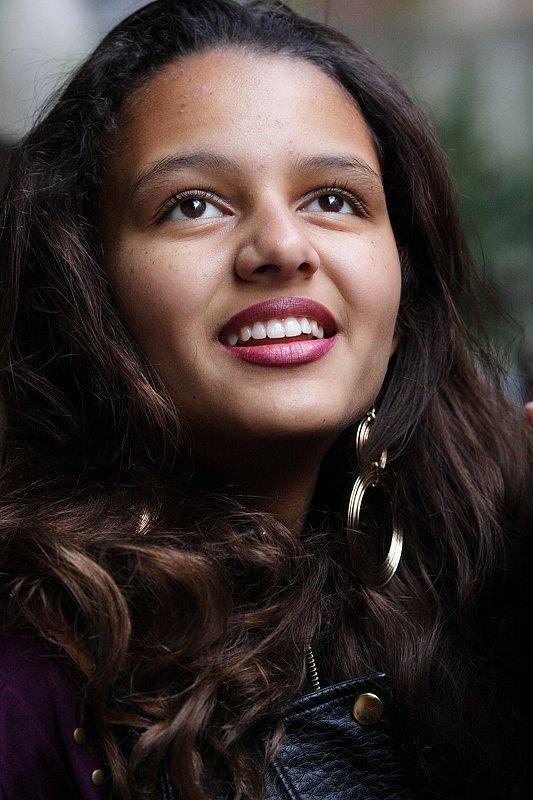Page Header
[ Enter you text here. ]
Where Eagles Soar (Isaiah 40:31)
You may be the next grant winner! Click here to apply.
There is no specific type of artist that we focus on or primarily support. Creative expression comes in a wide variety of artistic disciplines and genres. We are looking for passion and excellence in your craft. Tell us why your work is important to you and how you hope it will impact others.
Congratulations to St. Clair Detrick-Jules on a successful grant proposal! Detrick-Jules is a talented multi-disciplinary artist primarily focused on film.
The following is her proposal:
I've been creating art since I was two; at four, my mom framed my first "actually resembles something" painting--a pear, tilting to the left; it still hangs on her bedroom wall. In addition to painting, I love creative writing, sculpting, acting, and photography. But my one true passion--the passion which most directly allows me to incorporate my love for social justice--is film. Three summers ago, after finishing my sophomore year at Brown University, while all my friends were working at their paid summer internships at banks, consulting firms, law firms, or media companies, I decided to head home to Washington, DC and film around my neighborhood, seeing where it took me. Every morning, I set out with my cell phone camera and a tripod and interviewed young Latinx folks in my neighborhood for a video series meant to explore the "American Dream"; it ended up becoming "30 Days, 30 Stories." During my last semester of college, I made my first documentary, "DACAmented," which follows the stories of nine young DACA recipients.
Now as a recent college graduate, I'm ready to pursue being a full-time filmmaker. I believe in the power of filmmaking, and I believe documentary filmmaking reaffirms the humanity of the most marginalized among us. They say that sight is the most powerful of the senses; when I have a camera in my hand, I know I have the tool I need to create power--and therefore change--through art. Film captures events, captures moments, and captures the essence of human beings--and I can share this captured world with others. Whether it's a close up shot of a person's face--close enough to see the scars, the sweat, the wrinkles--or an adventure shot of a person jumping off a bridge into the river--catching the joy of the moment--film gives us the opportunity to feel. And lastly, I love documentary filmmaking because I get to have conversations with people. Many of us--including myself--have gotten accustomed to having superficial conversations and not taking the time to really sit down and talk to people and learn about their stories, their struggles, their dreams. I'm consistently moved by how willing people are to be vulnerable and share their life stories with me during filmed interviews, and it's a privilege to share their stories with the world through film.
Two years ago, I studied abroad in Ecuador. A significant part of the time was spent in the Ecuadorian Amazon, living in the small Indigenous community of Tzawata. Ever since oil and gold mining companies discovered that the Ecuadorian Amazon is full of oil, gold, and other valuable natural resources, they've been taking over Indigenous land. Mining, however, not only destroys the land, but it also destroys the lives of people who depend on the land to survive: in some parts of the Ecuadorian Amazon, oil spills have caused the cancer rate in some Indigenous communities to soar over 30%.
In 2004, Tzawata became a victim of this exploitation when their land was illegally sold to a local gold mining company in Ecuador, Merendon de Ecuador S.A. After ten years of peaceful resistance, Tzawata was granted legal rights to their land until the year 2050, at which point they'll have to, once again, fight for their land not to be destroyed by Merendon de Ecuador S.A. "Land cannot be bought or sold," one of the community members told me when I was there.
Now that I've graduated college and can dedicate myself fully to film and social justice, I'll be returning to Tzawata. Under the guidance of the Pachaysana Instititute, a Quito-based organization of international artists and educators, I'll be using film (primarily interviews and B-roll footage) to document the story the community of Tzawata to help raise awareness. As Indigenous people across the Americas--including in the United States--continue to face racism and discrimination, my project has the potential to reach a wide audience. And since I believe in artist collaboration and several of the children in Tzawata are interested in art, they'll be helping me film, which will give them more agency in terms of how their story is told and represented. This is a long-term project, but I'll be starting soon.
While everything I'm doing in Tzawata is volunteer-based, I still need to buy some more equipment. While I was at Brown University, I was able to use their equipment (which I used to film "DACAmented"). I have my own camera and a tripod, but I need to buy a Zoom microphone, a light reflector, a camera slider, and extra batteries (for long shooting days). Any grant funding I receive will go towards this equipment. Receiving funding and being able to tell the story of Tzawata would be a huge honor, and I'd be incredibly grateful. Thank you for considering my project.
Integrity: Arts & Culture Association is excited to be a part of such a worthwhile project and we wish St. Clair Detrick-Jules the best in all of her future endeavors!
CONGRATULATIONS IACA CYCLE #3
MINI-GRANT RECIPIENT, ST. CLAIR DETRICK-JULES!
Click here to learn about our other Cycle #3 mini-grant winner, Sandra Jackson-Opoku.
Photo Copyright © St. Clair Detrick-Jules
Website: 30days30storiesDC.com
